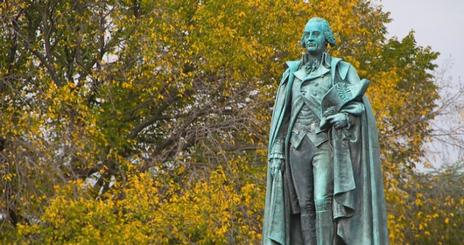Washington DC Communication Research Series Examines the Climate Change Debate, Celebrity Scientists, the Iraq War, and Public Diplomacy

Readers in the Washington, DC area are invited to join us at American University this Fall semester for a seminar series sponsored by the Doctoral program in Communication. The seminars will be held in Bender Library (map) with speakers, dates and times below. Video and podcasts based on the series will also be available later this Fall.
RESEARCH @ SOC SEMINAR SERIES — FALL 2011 SCHEDULE
Fri. Sept. 30–Science and Celebrity Studies: A Framework for Analyzing Scientists in Public
3:00-5:00pm, Bender Library, Room 115
Celebrity is a pervasive cultural phenomenon and an emerging area of academic interest, but scientific fame, compared to that of authors, academics, athletes and politicians, has been under-examined. This talk outlines a novel theoretical framework for examining prominent scientists as celebrities, one that draws on approaches from cultural studies, science studies and the historiography of science. This framework is used as a lens to examine the media portrayal of the British scientists and writers Stephen Hawking and Richard Dawkins.
DECLAN FAHY is Assistant Professor of Science, Environmental and Health Journalism in the School of Communication at American University. His research examines the media and cultural portrayal of prominent scientists such as James Lovelock and James Hansen as public intellectuals and famous figures, as well as the shifting roles and practices of science reporters. His peer-reviewed research appears in Journalism, Journalism Studies, Public Understanding of Science and several other interdisciplinary outlets. Fahy has covered science, health and environmental issues, as well as many other topics, as a reporter for the Irish Times and Irish Daily Mirror newspapers. He holds Ph.D, MSc, and BA degrees from Dublin City University.
Friday Oct. 21 – The Decision to Go to War: The Influence of Foreign Voices on U.S. Public Opinion
3:00-5:00pm, Bender Library, Room 115
Public opinion in the lead-up to the 2003 Iraq War presents a puzzle. Despite the fact that domestic political elites publicly voiced little opposition to the invasion, large numbers of Americans remained opposed to military action throughout the pre-war period, in contrast to the predictions of existing theory. This paper argues that some rank-and-file Democrats and independents expressed opposition because of the widely reported antiwar positions staked out by foreign, not domestic, elites. Merging a large-scale content analysis of news coverage with public opinion surveys from August 2002 through March 2003, the analysis shows that Democrats and independents — especially those with high levels of political awareness — responded to dissenting arguments articulated in the mass media by foreign officials. The results, which constitute the first empirical demonstration of foreign elite communication effects on U.S. public opinion, show that scholars must account for the role played by non-U.S. officials in prominent foreign policy debates.
DANNY HAYES is Assistant Professor of Government in the School of Public Affairs at American University. He received his Ph.D. in Government from the University of Texas at Austin in 2006. His research focuses on political communication and political behavior in American politics. A former journalist, he is interested in how information from the media and other political actors influences citizens’ attitudes during public policy debates and election campaigns. His work has been supported by the National Science Foundation and has appeared in the American Journal of Political Science, Political Research Quarterly, Political Behavior, and Political Communication, among others. Beginning in the fall of 2011, he will also be writing about public opinion for the Washington Post’s “Behind the Numbers” blog.
Friday, Oct 28 –The Effects of Partisan and Satiric News on Public Engagement with Climate Change
3:00-5:00pm, Bender Library, Room 115
Recognizing the growing influence of non-traditional sources of political communication in the contemporary media environment, this talk will address how such media — namely opinionated cable news and political satire programs — influence public engagement around the issue of climate change. This talk presents the results from two studies — the first which examines the coverage of climate change across the three major cable news networks and analyzes fluctuations in public opinion as a function of exposure to these networks. The second study explores the role of Comedy Central’s The Daily Show and The Colbert Report as sources of public attention to science, the environment, and climate change.
LAUREN FELDMAN is Assistant Professor of Public Communication in the School of Communication at American University, Washington, D.C. Feldman’s research examines the effects of news and political communication on public knowledge, attitudes, and behavior. She is particularly interested in the intersection of news and entertainment, and how less-traditional sources of political information—like late-night comedy and cable news—contribute to public perceptions of climate change. Her work has appeared in a number of edited books and peer-reviewed journals, including Communication Research, Political Communication, Political Behavior, and the Journal of Communication. Feldman holds a Ph.D and MA in Communication from the University of Pennsylvania and a BA in English from Duke University.
Friday, Nov. 4 – How Nation-States Translate Soft Power Objectives into Communication Practice
3:00-5:00pm, Bender Library, Room 115
Craig Hayden will discuss findings from his forthcoming book, The Rhetoric of Soft Power: Public Diplomacy in Global Contexts, to illustrate the comparative communication strategies inherent across a variety of public diplomacy and strategic communication programs -including China, the U.S, Venezuela, and Japan. Specifically, Hayden will examine the ways in which a “soft power” strategy is localized and embodied in the expectations of media effect, technological platforms, and audience conceptualization present in public diplomacy programs.
CRAIG HAYDEN is Assistant Professor in the International Communication Program at American University’s School of International Service. His current research focuses on public diplomacy, discursive analysis of foreign policy, and the impact of media technologies on international relations. He is particularly interested in the comparative study of public diplomacy and mediated culture as a pivotal resource for international policy, as well as the impact of communication technology on international influence and public argument. Hayden’s previous studies include analysis of media framing of the United States in pan-Arab media content, as well as analysis of media-based public argument by US presidential advisors prior to the invasion of Iraq in 2003. His forthcoming book, The Rhetoric of Soft Power: Public Diplomacy in Global Context, will be published in Winter 2011 by Lexington Books. Hayden received his Ph.D. from the Annenberg School of Communication at the University of Southern California.
Friday, Nov. 18 –Climate Change, Moral Judgments and Perceived Obligations Towards the Future
3:00-5:00pm, Bender Library, Room 115
There is widespread agreement among moral philosophers and many environmental advocates that climate change represents a moral imperative, ethically requiring meaningful and immediate ameliorative action. However, converging evidence from the behavioral and brain sciences suggests that the finely tuned human moral judgment system is not well-equipped to recognize complex, large-scale and unintentionally caused phenomena (such as climate change) as morally relevant. As a result, many non-experts may lack strong moral intuitions about climate change, inhibiting behavioral (including political) responses to the issue. Moreover, climate change is fundamentally an intergenerational issue involving an asymmetric power dynamic between current and future a generation, which poses additional challenges to individual and collective action on the issue. This talk identifies specific reasons why individuals fail to recognize climate change as a moral imperative and suggest a number of strategies communicators might employ in response. The presentation also focuses on closely related issues of intergenerational reciprocity and environmental stewardship.
EZRA MARKOWITZ is a Visiting Scholar in the School of Communication at American University and a doctoral candidate in Environmental Sciences, Studies and Policy at the University of Oregon. His research centers around the intersection of social and moral psychology, environmental conservation, communications and policy. His dissertation research examines the dynamics and mechanisms of intergenerational stewardship and reciprocity in the context of climate change. Other projects he is currently working on include an examination of the “compassion collapse” phenomenon in the environmental domain, research on active school transportation, and an analysis of cross-national climate change threat perceptions. Markowitz is a National Science Foundation Graduate Research Fellow, a Gallup Research Scholar, and a staff member at the Eugene-based non-profit PolicyInteractive.
See Also:
Join Doctoral Students In Examining the Intersections Among Media, Technology and Democracy
Internet Politics Scholars Join School of Communication at American University





